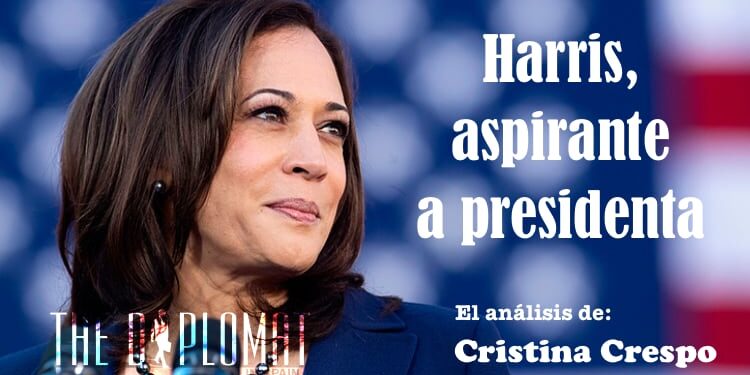SUMMARY
Just one week away from the ‘first Tuesday after the first Monday’, the presidential campaign in the United States continues to develop in a tight technical tie, with minimal percentage differences, in the states where the next president will be decided. Donald Trump and Kamala Harris are rushing the last days of their respective campaigns trying to scratch until the last vote. However, the Democratic candidate has lost some of the momentum she had after Joe Biden’s resignation.
Cristina Crespo / Instituto Franklin
With the current margin of error in the polls it is almost impossible to know at this point who will be the next president of the United States. The initial apparent illusion that Harris had generated in the month of September after the debate against Trump seems to be fading and this is reflected in the latest polls of voting intentions, in which the margins are increasingly narrower: 1.8 points according to FiveThirtyEight.
The vice president has focused her campaign on bringing a renewed air as Obama once did in his HOPE campaign. But the vice president is not Obama, nor is the world the same as it was in 2012.
Harris is playing with a positive image, which some call a forced smile and a ticket that complements her candidacy: Minnesota Governor Tim Walz. With this wise choice, Harris is trying to capture the rural middle class vote in the Midwest, which preferably opts for the Republican candidate, and in such important states as Michigan, Wisconsin and Pennsylvania.
The big issues of the campaign: inflation, abortion and immigration
When Americans are asked about the issues that concern them, inflation ranks first, followed by immigration, among others. What’s more, the latest Gallup poll suggests that in this election the economy will be the most influential issue since 2008. And, although according to macroeconomic data the U.S. economy has improved in terms of job creation and lower inflation, the average citizen is still concerned about rising prices. According to a study by The Cook Political Report, the perception of the economy has improved in recent months, but when the question is directed to the group of undecided or people who vote for a third party, 70% believe that it has worsened. And in this group, when asked which of the two candidates would be better able to solve the inflation issue, 55% say Trump and 26% say Harris.
Harris has been at her best on issues such as abortion, which she has been campaigning on as vice president since the Supreme Court in June 2022 overturned Roe v. Wade, which protected abortion rights nationwide, leaving jurisdiction at the state level. Some states have restricted the right altogether and others have pushed for state laws to protect it. Some states have even chosen to place the issue as a referendum question on the November 5 ballot. This is why Harris has strengthened her position in defense of a woman’s right to choose, knowing it was a positive for her campaign.
However, the management of the immigration issue at the southern border of the United States, which President Biden entrusted to Harris, has been the main attack of the Republicans. For this reason, the Vice President has changed her discourse by promising to increase border security, as she knows that it is an issue that worries citizens in the Southern states, especially in the Sun Belt states that will be decisive in 2024 (Arizona, Nevada and Georgia).
Sorority vs. Trumpism
While many have fallen for the comparison, neither is Kamala Hillary, nor is 2016 anything like 2024. A case in point is Harris’ inclusive leadership and the support of influential women from fields as diverse as they are disparate. The probably most media-worthy case was that of singer Taylor Swift announced on Instagram to her 283 million followers, as she justified, “for the rights and causes that I believe need a warrior to stand up for them”. Swift is not only a global star, she is a young Generation Z icon songwriter originally from Pennsylvania and raised in the Midwest. An artist who symbolizes the American dream and has become one of the 100 most influential people in the world.
In the business world, the figure of Lauren Powell Jobs, widow of Steve Jobs and Silicon Valley billionaire who has always positioned herself on the side of the Democrats and who has particularly supported Harris for more than twenty years, stands out. This is a decisive support both for the economic injection to the campaign, as well as for her position among the technological elite disenchanted with the Democratic Party since the Biden Administration adopted antitrust measures against large technology firms; and also for the irruption of Elon Musk in Trump’s campaign.
On the other hand, one of the biggest surprises of the last few weeks occurred when former Republican Congresswoman Liz Cheney appeared at a Harris rally asking for Harris’ vote in Wisconsin, and addressing the more moderate Republicans in the most contested Rust Belt states. Cheney and Harris hold very different positions in ideological terms, especially on issues such as abortion, but they are united by their defense for democracy, patriotism (as Cheney has assured) and, above all, the firm purpose of preventing Trump from returning to the White House.
For the moment, Vice President Harris maintains her position as a contender and the chances of seeing a President Harris could be reduced to November 2021, when she held the position in office during the hour and 25 minutes that lasted the medical intervention to which Joe Biden underwent.
 Cristina Crespo
Cristina Crespo
Collaborating researcher at Instituto Franklin-UAH
She is a professor, researcher and expert in American politics. She has been the general coordinator and director of External Relations of the Franklin Institute at the University of Alcalá. She holds a PhD in North American Studies from UAH, an MA in European Studies from Heriot-Watt University (Edinburgh) and a BA in Translation and Interpreting from the University of Malaga. In 2014 she was chosen to participate in the Young Leaders Program of the U.S. Department of State. She is the author of La alianza americana. Spain’s Counterterrorism Strategy and Hypano-American Relations (1996-2004) and co-editor (with Alicia E. Kaufmann) of Hillary. El poder de la superación, published in this same collection.






